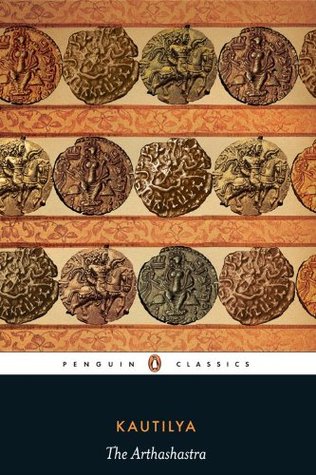More on this book
Community
Kindle Notes & Highlights
‘Every neighbouring state is an enemy and the enemy’s enemy is a friend.’
The prosperity of the state and its inhabitants cannot be maintained unless new territory is acquired by settlement of virgin lands, by alliance or by conquest. In a political environment which had many kings, any one of them resting content with his own territory was likely to fall prey to the expansionist ambitions of another.
Kautilya did take a cynical view of humanity and his teachings are based on the principle that no one can be trusted.
While Kautilya has no compunction about exploiting the gullibility of the people, he himself had no belief in magic or the occult. Most of his phenomena are tricks which he tells us how to perform; poisons and stupefying chemicals are frequently mentioned. Kautilya did not even believe in astrology. ‘Wealth will slip away from that childish man who constantly consults the stars. The only guiding star of wealth is itself; what can the stars of the sky do?’
Kautilya describes many secret methods by which a foreign ruler may be killed; he would not have been surprised about the attempts of the United States to kill Fidel Castro with an exploding cigar or about the arguments whether a CIA-supported coup could end in the ‘accidental’ death of the foreign ruler.
However, [Kautilya adds] if a country consists predominantly of agriculturists, the calamity [to the few fortifications] would be more serious. Conversely, in a country inhabited mostly by martial people, calamities to the [comparatively more limited] country territory would be more serious.
Kaunapadanta considers a calamity to the army to be worse than a calamity to the treasury. One is dependent on the army for controlling allies and enemies, winning over an enemy’s army and reinforcing one’s own. In the absence of an army, the treasury is sure to be lost, whereas, even without finance, an army can be used not only to collect raw material and agricultural produce but also to seize enemy land. [Eventually,] the treasury can be replenished by the army. Being close to the king, the army is like the minister [and a calamity to it has to be ranked as high as that of a minister.]
...more
The king shall make a treaty with an upright man [and keep it.] With a villain, a treaty shall be made with a view to outmanoeuvring him. {9.3.36,37,40,41}
Kautilya propounded the theory that (i) an immediate neighbouring state is an enemy and (ii) a neighbour’s neighbour, separated from oneself by the intervening enemy, is a friend. This is, no doubt, almost always valid. Nevertheless, to reduce Kautilya’s theory on foreign policy to just these two observations is to do him a grave injustice. Indeed, the theory deals with not just three states, but with a maximum of twelve.
Kautilya’s eminently practical approach to foreign policy is shown by his disagreement with earlier teachers on how a weak king should behave. ‘One should neither submit spinelessly nor sacrifice oneself in foolhardy valour. It is better to adopt such policies as would enable one to survive and live to fight another day’ {7.15.13-20, 12.1.1-9}.
Since prudence should always govern choice of policy, Kautilya is against both spineless submission and foolhardy valour. This advice is given twice, in {12.1.1-9} and {7.15.13-20}. Therefore, peace should always be preferred to war: ‘When the degree of progress is the same in pursuing peace and waging war, peace is to be preferred. For, in war, there are many disadvantages, such as loss of troops, expenditure and absence from home’ {7.2.1,2}. The corollary is that staying quiet is preferable to preparing for war.
Of the three categories of kings, stronger, equal and weaker, peace is to be made with the first two; war is recommended only against a weaker adversary since it brings gains at least cost {7.3.1-5}.
Prosperity changes peoples’ minds.
For fighting the attacker-in-the-rear, unreliable troops should be used, thus killing two birds with one stone-warding off the attack while getting rid of treacherous troops.]


